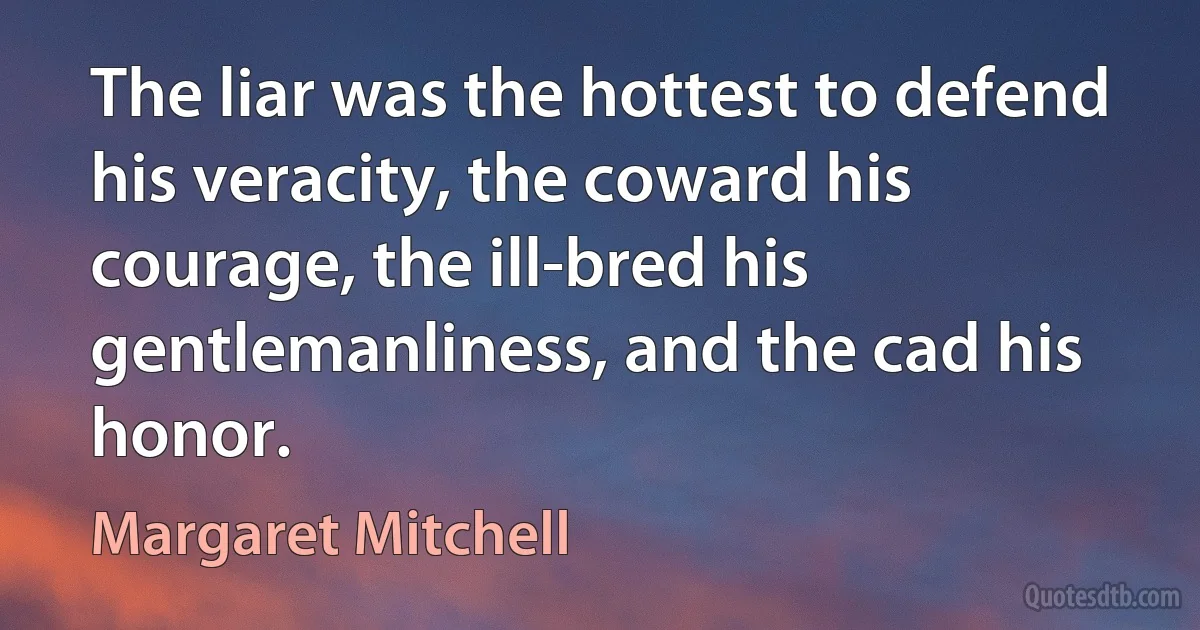Veracity Quotes
Now see what a Christian is, drawn by the hand of Christ. He is a man on whose clear and open brow God has set the stamp of truth; one whose very eye beams bright with honor; in whose very look and bearing you may see freedom, manliness, veracity; a brave man--a noble man--frank, generous, true, with, it may be, many faults; whose freedom may take the form of impetuosity or rashness, but the form of meanness never.

Frederick William Robertson
The Age that admires talk so much can have little discernment for inarticulate work, or for anything that is deep and genuine. Nobody, or hardly anybody, having in himself an earnest sense for truth, how can anybody recognize an inarticulate Veracity, or Nature-fact of any kind; a Human Doer especially, who is the most complex, profound, and inarticulate of all Nature's Facts? Nobody can recognize him: till once he is patented, get some public stamp of authenticity, and has been articulately proclaimed, and asserted to be a Doer. To the worshipper of talk, such a one is a sealed book. An excellent human soul, direct from Heaven,-how shall any excellence of man become recognizable to this unfortunate? Not except by announcing and placarding itself as excellent,-which, I reckon, it above other things will probably be in no great haste to do.

Thomas Carlyle
The Christian Religion not only was at first attended with miracles, but even at this day cannot be believed by any reasonable person without one. Mere reason is insufficient to convince us of its veracity: and whoever is moved by Faith to assent to it, is conscious of a continued miracle in his own person, which subverts all the principles of his understanding, and gives him a determination to believe what is most contrary to custom and experience.

David Hume
Facts are but the Play-things of lawyers, - Tops and Hoops, forever a-spin... Alas the Historian may indulge no such idle Rotating. History is not Chronology, for that is left to lawyers, - nor is it Remembrance, for Remembrance belongs to the People. History can as little pretend to the Veracity of the one, as claim the Power of the other, - her Practitioners, to survive, must soon learn the arts of the quidnunc, spy, and Taproom Wit, - that there may ever continue more than one life-line back into a Past we risk, each day, losing our forebears in forever, - not a Chain of single Links, for one broken Link could lose us All, - rather, a great disorderly Tangle of Lines, long and short, weak and strong, vanishing into the Mnemonick Deep, with only their Destination in Common.

Thomas Pynchon
My father's moral inculcations were at all times mainly those of the "Socratici viri;" justice, temperance (to which he gave a very extended application), veracity, perseverance, readiness to encounter pain and especially labour; regard for the public good; estimation of persons according to their merits, and of things according to their intrinsic usefulness; a life of exertion in contradiction to one of self-indulgent sloth. These and other moralities he conveyed in brief sentences, uttered as occasion arose, of grave exhortation, or stern reprobation and contemp. But though direct moral teaching does much, indirect does more; and the effect my father produced on my character, did not depend solely on what he said or did with that direct object, but also, and still more, on what manner of man he was.

John Stuart Mill
It is important for the apologist who desires to be obedient to the Word of God in defending the faith to pay special attention to the fact that throughout Scripture, God's veracity is not defended, but accepted from the outset on His authority. Unless we have more wisdom than that contained in the revelation of God, we should take the same attitude.

Greg L. Bahnsen



